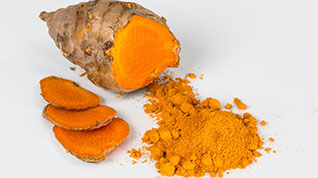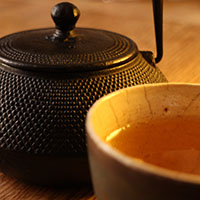



After the water ritual (link) you should drink turmeric tea. Preparation: Add ½ teaspoon of turmeric powder to a cup filled with hot water. Sweeten with a teaspoon full of honey. The tea should be drunk hot.
Turmeric (Curcuma longa) is a flowering plant in the ginger Familie.
The rhizomes (rootstock) are used fresh or in water and dried and then ground powder into a deep orange yellow powder, which is often used as a colour and aroma fabric in many Asian kitchens, especially for curry, as well as because of the dyeing properties awarded it the main component of turmeric, (curcumin).
Turmeric powder has a warm, bitter taste reminiscent of black pepper and an earthy, mustard -like aroma.
Curcumin, a bright yellow chemical that is produced by the turmeric plant.
It is approved as a food additive.
Food additives are substances that are added to food to preserve the taste or to improve the taste, appearance or other sensory properties
Turmeric is used for a long time in Ayurvedic medicine and Traditional Chinese Medicine (TCM).
There are now indications that consumption of turmeric or curcumin is effective to prevent and treat the following diseases.
Turmeric is rich in phytonutrients that may protect the body by neutralizing free radicals (pollution) and shielding the cells from damage.” Diets rich in plant-based foods are associated with prevention of medical conditions such as cancer and heart disease.
In addition to antioxidant effects, turmeric has also been shown to lower cholesterol and triglycerides in people at risk of heart disease, and may improve blood pressure.
Antioxidants in turmeric may also reduce the risk of cataracts, glaucoma and macular degeneration.
Turmeric cleaning the brain.
There is growing evidence that curcumin can cross the blood-brain barrier and may help to protect against Alzheimer’s disease.
Turmeric can break down fluoride in the brain.
It works to reduce inflammation as well as the build-up of protein plaques in the brain that are characteristic of Alzheimer’s disease sufferers. There is some evidence that curcumin can help in depression and mood disorders. Turmeric supplements lowered depression and anxiety symptoms and depression scores in multiple trials. High doses of turmeric could have a blood-thinning effect.
Cooking with turmeric shouldn't cause problems.
